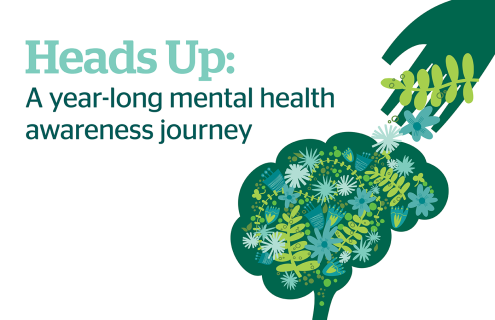
Think back to the most embarrassing things you did as a teenager. Remember that awful time the other kids laughed at you on the playground? Chances are those missteps are not widely known, and the few jeering peers present for them are now long forgotten. All have since been relegated to a box of memories labeled “growing pains” and tucked away in the recesses of your mind.
Now imagine teens and younger kids today who are experiencing similar things in the harsh spotlight and highly visible stage of social media, advertised on a virtual marquee and recorded on an internet where everything exists far longer than we’d like, or can imagine, it to.
“The problem now is we can do a lot more damage and do it more quickly than we can undo it,” said Steven Schlozman, MD, a child psychiatrist at Dartmouth Health Children’s.
This month, Dartmouth Health is continuing its year-long mental health awareness series, Heads Up, by focusing on how social media affects mental health, particularly among young people.
Schlozman says the permanence and public nature of social media can be a recipe for an acceleration in rates of depression and anxiety, an increased severity of symptoms, and a growing prevalence of the myriad disorders that accompany anxiety, such as eating disorders and substance use disorder.
These conditions are serious, so Schlozman recommends parents find ways to lessen their child’s engagement with social media, such as setting aside some outdoor play time, but he cautioned against a complete prohibition. Much like the playground, social media is a neutral arena with the potential for both destructive and constructive social development, he said.
“Social media is more than an app on a child’s phone or tablet. These are dynamic communities where young people socialize, learn, and support each other, despite all the challenges,” said Heather Inyart, Executive Director of Media Power Youth, a Manchester-based youth development organization. “Our mission at Media Power Youth is to inspire young people to engage with media in ways that support well-being.”
“It’s more nuanced than it’s often presented, as are many things,” Schlozman said of social media. “The biggest prevailing sort of half-myth … is that it’s necessarily bad.”
Schlozman said we need to find a balance that works and the best ways to protect people who are vulnerable to it.
While digital natives are particularly resilient to the darker sides of social media, Schlozman said, the developing minds of the young are generally less insulated from the emotional highs and lows of perceived slights and unfavorable measurements of worthiness from their peers. It’s not until they mature that the more primitive fight-or-flight center of the brain routes its input through the more tempered and logical part of the brain. In a word, they’re more likely to overreact.
“So, if they go online and they see something mean, they don’t even stop to think, ‘this isn’t even about me,’” Schlozman said.
To a lesser extent, many of these same dynamics can have a negative impact on adults as well.
He said the prevailing theory among academics who study social media use is that moderate engagement with it doesn’t necessarily have any negative side effects.
One might think the isolating pandemic lockdowns and virtual classrooms led to only excess social media use and subsequently high rates of mental illness, but Schlozman said social media also served as a lifeline to many young people, particularly teenagers.
“That’s especially an age where you look to your peers for assurances, opinions, literally just to bounce ideas off of,” he said.
Meanwhile, some students, such as those with autism, recorded more positive mental health outcomes as a result of staying connected with friends via the internet. In some cases, Schlozman said young people experiencing suicidal thoughts surprisingly found emotionally supportive spaces on platforms like Reddit, where they shared their thoughts and positive commenters responded.
“In cases like these, social media can literally save lives,” Schlozman said.
Schlozman and Inyart participated in a recent Heads Up webinar hosted by Dartmouth Health on the topic of youth mental health and social media. Watch the webinar.